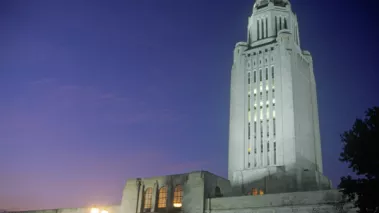Table of Contents
Nebraska legislators should support student journalism by passing LB 88

The Nebraska State Capitol in Lincoln.
In a promising development, Nebraska’s LB 88, a student press freedom bill sponsored by Sen. Adam Morfeld and patterned on the Student Press Law Center’s “New Voices” model legislation, recently passed out of general file with substantial bipartisan support in a 28-15 vote. The bill has now been placed on select file, the second stage at which a bill is considered by the full legislature.
If enacted, LB 88 would protect student journalists at public institutions of higher education from administrators’ prior review and censorship by establishing school-sponsored media as public forums and by affirming that “a student journalist has a right to exercise freedom of speech and of the press in school-sponsored media.”
The bill also establishes that “each student journalist is responsible for determining the news, opinion, feature, sports, and advertising content such student produces for school sponsored media.” (LB 88 would extend similar protections to public high school students, though FIRE remains neutral on this issue at the K-12 level, as our mission is focused on institutions of higher education.)
As FIRE Legislative and Policy Director Joe Cohn wrote in 2016:
[A] free student press is exceedingly important, not just because it gives students a space to learn investigative and writing skills, but also because student newspapers often educate the broader community about matters of public concern. When student journalists cannot perform this function without the threat of punishment or censorship, the campus community can miss out on critical information.
Legislation like LB 88 is vital to ensuring that student journalists’ rights are protected as they perform this important work. These rights face significant threat from two decisions that narrowed student journalists’ First Amendment rights. First, in Hazelwood v. Kuhlmeier, the U.S. Supreme Court ruled that school administrators in the K-12 setting have the authority to censor school-sponsored publications if they have “legitimate pedagogical reasons” for doing so. College administrators have historically not enjoyed the same authority to subject the work of student journalists — who are typically adults — to the prior review authorized in Hazelwood. Unfortunately for students under the jurisdiction of the U.S. Court of Appeals for the Seventh Circuit, in Hosty v. Carter the court extended the Hazelwood ruling to college publications — in FIRE’s view, an erroneous decision worthy of reversal.

The Seventh Circuit covers Indiana, Illinois, and Wisconsin, but FIRE has raised concerns that the opinion’s influence could spread further. As seen in our student press censorship report, administrators are all too willing to censor student publications across the country. LB 88 would prevent the spread of the Hosty decision to Nebraska and would defend the critical freedom of collegiate student press to explore, write, and investigate on campus.
According to the SPLC, 11 states have passed legislation protecting collegiate student journalists from the type of administrative control that has been used to suppress stories and punish students for inconvenient coverage and commentary. Over the years, FIRE has publicly supported several of these measures — including prior versions of LB 88, which we have supported since its original introduction in 2016 — and urges the Nebraska legislature to join these states by finally passing LB 88. In the meantime, FIRE offers numerous resources to student journalists facing administrative pushback, including a censorship hotline.
Recent Articles
Get the latest free speech news and analysis from FIRE.

TICKETS ON SALE: Step up to the Soapbox in Philadelphia, Nov. 4-6, 2026

The secret war against student journalists

The Federal Bureau of Investigation (of protected speech)
